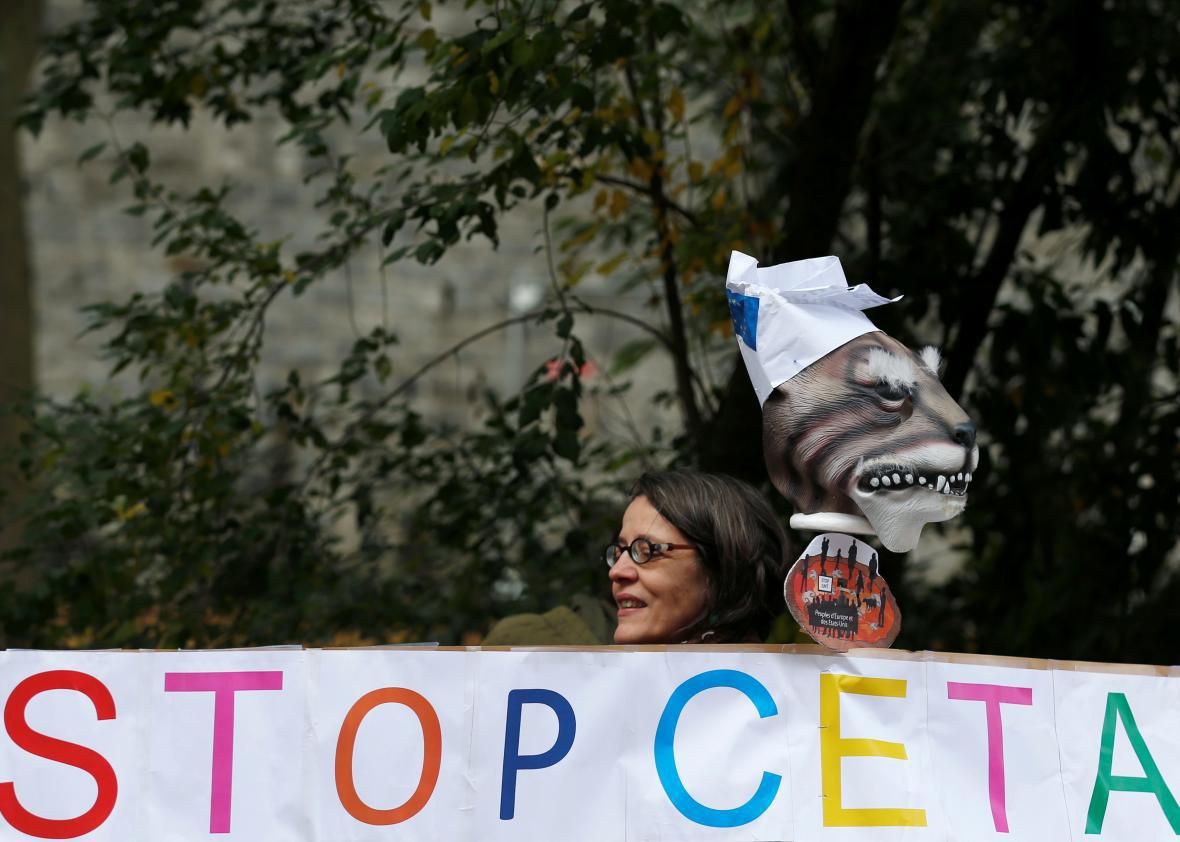Have you ever heard of Wallonia, home of the Walloons? It sounds like a place Roald Dahl might have invented, but is in fact the small, French-speaking region of Belgium, with a population of about 3.5 million. It is not, typically, a star player in world affairs. But as of now, the Walloon Parliament may be about to single-handedly bring about the collapse of a free trade deal between Canada and the European Union that has been in the works for seven years, providing the world with yet another example of the EU’s utter political disarray.
The politics of this situation are almost as byzantine as they are absurd. Canadian and European officials have been trying to finally wrap up the Comprehensive Economic and Trade Agreement, or CETA, a historic deal that would nix 98 percent of tariffs between the two sides. But under its own rules, the EU needs unanimous consent of all 28 of its member nations in order to ratify a new trade pact—and Belgium is awkwardly holding out. While its federal government supports the accord, it can’t officially sign without the blessing of its five regional parliaments.
That’s where Wallonia comes in. Last week, lawmakers there voted 46–16 to reject CETA, which has been a target of large, left-wing anti-globalization protests across Belgium. Negotiators were left scrambling to write up some side language that would accompany the deal that they hoped would appease the Walloons’ concerns. It hasn’t worked yet, and on Friday things came to a head. Canadian Trade Minister Chrystia Freeland marched out of talks in Brussels “on the verge of tears” and all but declared the deal dead. “It seems evident for me and for Canada that the European Union is not now capable of having an international accord even with a country that has values as European as Canada,” she said, adding that “Canada is disappointed, but I think it is impossible.” Others seem more hopeful; EU Trade Commissioner Cecilia Malmström, for instance, tweeted that “Good progress had been made in most areas of concerns for Wallonia in talks on CETA. I sincerely believe this is not the end of the process.” But things are certainly looking dicey.
Wallonia is a bit like Belgium’s rust belt—a relatively poor region suffering from industrial decline and high unemployment (the Financial Times has called the city of Charleroi “Europe’s Detroit”). As Tim King has explained for Politico, its socialist-led government shares many of the same concerns about trade deals as the rest of Europe’s left. As far as CETA goes in particular, it’s raised issues about agricultural protections and the controversial arbitration process investors can use to sue states, otherwise known as ISDS, that for better or worse is included in most modern trade deals, and has caused alarm among U.S. liberals skeptical of the Trans-Pacific Partnership.
But the absurd thing isn’t that Walloons may have qualms about CETA. It’s that they’re currently exercising veto power over a trade pact that would affect more than 500 million people. It’s as if Ohio’s state legislature could unilaterally decide whether or not the United States signed onto the TPP. Nobody in their right mind would design a system of governance that way.
You can blame this situation on the EU’s own technocrats who, in an unusual step meant to appease globalization skeptics in the wake of Brexit, decided to give national and some regional parliaments veto power of CETA. In theory, that was a pragmatic gesture toward democracy. In practice, the bizarre precedent it has set is calling into question whether the EU will be able to hammer out new trade deals going forward, including a secession agreement with the United Kingdom. Even if this deal somehow survives the Walloon insurrection, this episode is one more sign of how Europe is fraying at its seams.
